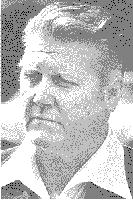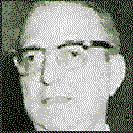 |
|
Frank Sheeran
|
� I wasn�t born into the mafia life like the young Italians were, who came out of places like Brooklyn, Chicago, and Detroit. I was Irish Catholic from Philadelphia, and before I came home from the war I never did anything really wrong. I was born into some rough times. They say the Depression started when I was nine years old in 1929, but as far as I was concerned our family never had money. �I learned a lot of Italian words as a kid and in the Sicilian and Italian campaigns during the war. The people I got involved with after the war were very impressed with how I spoke Italian. They took it as a sign of respect toward them. It made it a lot easier for them to confide in me and trust and respect me.� (Frank �The Irishman� Sheeran, in C. Brandt. �I Heard You Paint Houses,� 2004)
In 1955, Frank �The Irishman� Sheeran was pushing a rig loaded with a cargo of meat north from Philly to Syracuse, NY. When passing through Endicott, NY, his truck had engine trouble.
 |
|
Russell Bufalino
|
While looking at the engine wondering what to do, a short, older Italian guy strolled over and offered his assistance. With his box of tools, the engine was soon running smoothly. That was the Irishman�s first encounter with Russell Bufalino, the Quiet Don, so called, whose bite was worse than his bark. Russ and Frank hit it off from the start. Russ became Frank�s � padre/padrone,� shaping him from a six-four, hard- muscled roughneck and small-time thief to a feared mob assassin, and introducing him to the tough mug Jimmy Hoffa, a Teamsters official and union organizer, who guided Sheeran�s rise in the Teamsters organization.
Bufalino�s presence in Endicott that day was no accident. He had a residence in Endicott because he did business with Joe B. Barbara, an associate and legitimate businessman, who had had longtime connections with Magaddino, the Buffalo capo, and had been involved, since the 1920s, with the Pennsylvania-Western New York combine, of which Bufalino was a major player.
At that time Sheeran knew nothing of the mafia or its reach. He considered his Italian acquaintances in downtown Philly as freelancing punk crooks that eked out a livelihood on opportunistic criminal scams. It was only with the failed Apalachin mob meeting of November 1957 at the farm estate of Joe Barbara (six miles from Endicott) that he realized the dimensions and possibilities for him of �Our Thing.� In his heart, the drifter and stand-up Irishman was delighted. He had found a home, at long last, and Bufalino had a prot�g� who would willingly do his bidding. They were a particularly odd couple�why they became fast friends, Frank the product of an abusive ex-pugilist Irish father and a Swedish mother, and a Sicilian of the Old School, is a fascinating story in itself. Perhaps Frank had finally found a mentor, worthy of the name, and Russell an avid pupil. Bufalino the father figure, long sought, and Sheeran the obedient son, long yearning. The entrenched mafia heroic code that Bufalino represented nourished the emotionally blocked Irishman, who had found his compass in the company of a tightly knit Sicilian-American family. No wonder that Frank considered Russ as �one of the two greatest men I ever met.� Russ �respected a man who was hard but fair, like himself. Once he told you something, you could count on it. Whether it was good or bad for you, you could count on it.�
Russell A. Bufalino was born Rosario Bufalino in 1903 in Catania, Sicily. He was an infant when his family disembarked at Ellis Island for immigrant processing.
Bufalino began his criminal career while in his teens. His arrest record dates back to the mid-1920s with such charges as petty larceny, receiving stolen goods and conspiracy to obstruct justice. The first serious conviction was in 1977 when he served four years for extortion after threatening a witness, Jack Napoli, a con man, who owed $25,000 to a diamond fence with the Bufalino family. At the sit-down over the money, Napoli wore a wire to get the goods on Bufalino, and Bufalino complied by threatening to strangle Napoli if he did not come up with the cash. Jimmy �The Weasel� Fratianno was given the contract to whack Napoli, but he had disappeared into the Witness Protection Program and the hit failed. Russell was convicted. Furious over Napoli�s lack of honor in the diamond deal, the Quiet Don summed up his feelings in court: �If you had to deal with an animal like that, Judge, you would have done the same thing.�
Bufalino had a hand in many pies. His operational base was in Pittston, PA. In New York he had garment and trucking interests and made union deals. He extended the boundaries of his domain into upstate New York and New Jersey, and also was considered a behind-the-scenes major operator in the corrupt Teamsters union affairs, which made him an obvious suspect with the disappearance of Jimmy Hoffa in 1975.
�He was old-school,� recalled a former police chief from the Pittston area, �a perfect gentleman. You wouldn�t know he had two dimes to rub together from looking at his house or the car he drove.� Even though the Quiet Don was a �shadowy� figure or probably because of that, the McClelland Committee on Organized Crime called him �one of the most ruthless and powerful mafia leaders in the United States.� And also deceptive and shrewd, because he escaped the fate of many mafiosi, living a long life and dying in bed.
Initially an MP in the army, Frank Sheeran volunteered for the infantry and fought in the bloody, slogging Italian campaign against fierce German resistance. A close witness to the horrors of war, he did not hesitate to shoot prisoners taken in combat. Orders were orders, was his rationalization. This conditioned him, by his own account, to view life as expendable, a cheap commodity. In war killing was the solution. This mindset apparently extended to the mob rubout: violence as a form of justice and retribution.
�Murdering our own was a fact of life. Nobody like doing it, but it was the only way to maintain control.� (Joseph Iannuzzi. Joe Dogs, 1993)
�You gotta do what you gotta do.� (Angelo Bruno, Philly capo, to Frank Sheeran before his first hit.)
�Somewhere overseas I had tightened up inside, and I never loosened up again. The war taught me how to control my feelings when called for. If you want to know how I felt�I felt nothing. You get used to death. You get used to killing. You lost the moral skill you had developed in civilian life. You developed a hard covering, like being encased in lead.� (Frank Sheeran)
�Remorse is something you could feel with Sheeran, but it�s something he had no vocabulary for.� (Charles Brandt recalling Sheeran as an old man.)
Bufalino called upon the Irishman many times to take care of business. There was the shooting of Crazy Joe Gallo at Umberto�s Clam House in Little Italy, New York City.
�I didn�t know who Russ had in mind, but he needed a favor and that was that. They didn�t give you much advance notice. I don�t look like a mafia shooter. I have very fair skin. None of these Little Italy people or Crazy Joe and his people had ever seen me before. I walked in the Mulberry street door where Gallo was. �A split second after I turned to face the table, Gallo�s driver got shot from behind. Crazy Joey swung around out of his chair headed toward the corner door. He made it through to the outside. He got shot three times. He had no chance of making it. Crazy Joey went to �Australia� [Down Under] on his birthday on a bloody city sidewalk. They say that there were three shooters, but I�m not saying that. I�m not putting anybody else in the thing but me. If you do it yourself, you can only rat on yourself. An old-time Irish guy with a lot of combat experience was a benefit. Bufalino was able to provide for important matters like Gallo. The Commission always gave Russell anything really big.�
And then there was the still mysterious case of the Jimmy Hoffa assassination for which Frank takes credit. He became a close associate of Hoffa and prospered over the years with Hoffa�s blessing. Frank owed Jimmy a great deal. He was Hoffa�s aide and confidant, his right-hand man and enforcer. Frank watched Jimmy�s back, at least until that fateful day in Detroit. Despite the close relationship, Frank faithfully reported back to Bufalino what Hoffa said and did. Hoffa was a hothead with an uncontrollable big mouth who confused foolhardiness with courage. When Jimmy became in the mob�s judgment a loose cannon who could compromise the Teamsters ties with the �boys,� thereby bringing heat and unwanted publicity on the mob, Bufalino signaled for the Irishman.
Sheeran claimed he was not conflicted when he was informed of the target. �Not even a little bit. They only had two choices. Kill me or put me into the thing.� Frank was loyal to both Hoffa and Bufalino, but it was to Bufalino to whom he owed the most and loved the most. �I had seven contracts out on me over the years and Russell was able to square every one of the beefs. Even though he was a boss, Russ had to do what he had to do. They [the mafia] took care of bosses, too. If they decided not to use me in the thing Jimmy would have been just as dead. I would have been dead along with him. They even told me later on.� Frank did it with surgical precision: �My friend did not suffer.�
Over the years the authorities made sure that the men involved in the Hoffa slaying were prosecuted to the full extent of the law on other charges. The RICO legislation facilitated that process. At age 79, Bufalino got fifteen years and died at age ninety in a nursing home. Sheeran received thirty-two years, in 1982, when he was 62 years of age. He was released in 1995, sickly and infirm, and died December 14, 2003, at age 83, but not before he made his peace with the Church and confessed all to his former attorney, Charles Brandt, breaking the code of honor he swore to uphold after it was too late for the Feds to bring him to justice.

